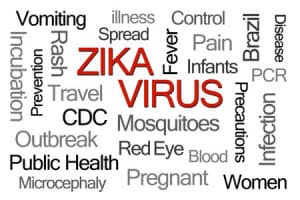 There has been a lot of talk recently about the Zika virus, a mosquito borne illness that, while rare, has been linked to birth defects. The media has been keeping the public informed, but the public is still concerned. The virus has been found in people who have traveled to infected countries and returned to the U.S. In fact, just last week, the Georgia Department of Public Health confirmed Georgia’s first case of sexually transmitted Zika. It does seem to be gaining traction in this country; so, gaining an understanding of and knowing the facts about Zika virus could help keep your family healthy.
There has been a lot of talk recently about the Zika virus, a mosquito borne illness that, while rare, has been linked to birth defects. The media has been keeping the public informed, but the public is still concerned. The virus has been found in people who have traveled to infected countries and returned to the U.S. In fact, just last week, the Georgia Department of Public Health confirmed Georgia’s first case of sexually transmitted Zika. It does seem to be gaining traction in this country; so, gaining an understanding of and knowing the facts about Zika virus could help keep your family healthy.
How Zika Virus Is Transmitted
Zika is transmitted by a certain type of mosquito that has been infected with the virus. That Aedes genus of mosquitoes is a known vector for several diseases including chikungunya, dengue fever, and Zika. The primary carrier of the virus, the Aedes aegypti mosquito lives mostly in sub-tropical and tropical regions. However, the Aedes albopitus, the Asian tiger mosquito, may also carry the disease. The virus can also be spread by sexual contact.
Where the Zika Virus Is Found
The Zika virus was first documented in Africa in 1947. It had infected rhesus monkeys in Uganda’s Zika forest. In 1968 it was confirmed as a disease that afflicts humans. Over the years, it has remained a rare illness that was limited to the western Pacific Island, Southeast Asia, India, and Africa. In recent years, infections have been noted in South and Central America as well as the Eastern Pacific. Reports of cases of the virus have recently been reported in Georgia, New York, Texas, Florida, and Illinois.
Chance of a U.S. Outbreak
It is not likely that infected mosquitoes will make their way to the United States. However, it is plausible that there is a possibility that Zika can spread locally. An increase in imported cases of the virus could result in it being spread to mosquitoes from infected humans. The chances of this increase as summer nears.
Zika Virus Symptoms
The majority of Zika virus cases present no symptoms. In fact, of the people who are infected with the virus, only about one in five show any symptoms. Zika virus symptoms include:
- Fever
- Mild headaches
- Joint pain
- Conjunctivitis
- Rash
How Zika Virus Is Treated
There is no medication that directly treats the Zika virus, and there is no vaccine against it. However, it is a self-limiting illness; so, supportive care is usually sufficient. The symptoms are treated until the illness passes. The U.S. Government is working to develop a vaccine against Zika virus as it becomes more prevalent in America.
Zika Virus and Birth Defects
Researchers are still learning about how Zika affects the unborn child in a pregnant mother. There have been studies examining the transmission of the virus from mother to child, and these studies indicate that a mother who is infected near the time she is to give birth does have the potential to pass it on to her child. This is considered to be rare though.
The major concerns that have arisen in regard to the Zika virus and newborn babies, is its apparent link to microcephaly, a neurological disorder that disrupts brain development in infants. Children with this disorder die very early in life and are born with small heads. In 2015, Brazil saw 2,782 cases of microcephaly. This coincided with the outbreak of the Zika virus. Contrast that to just 167 cases in 2013 and 147 cases in 2014.
At North Fulton Pest Solutions, we care about your family’s health. Call today and speak to a member of our friendly staff to find out how our innovative, environmentally responsible pest control solutions can help you keep your home pest free.

